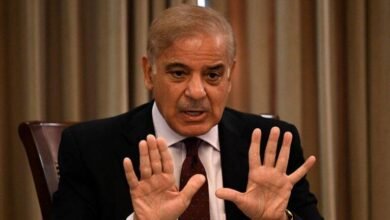
PARIS:
The theatre director responsible for the most ambitious Olympics opening ceremony in history in Paris this July was so overwhelmed by the task when first asked to do it that he rang his mother in tears.
Thomas Jolly, one of France’s most talented young directors, experienced “a feeling of vertigo” when approached to be artistic director for the open-air parade on the river Seine in front of a TV audience of billions.
His task: design a ceremony that will see thousands of athletes sail six kilometres (four miles) down the river in a flotilla, the first time a Summer Olympics has begun outside the main stadium.
The modest 42-year-old prodigy needed not only to develop a spectacular concept, but has also been dealing with a range of security, budget, architectural and even wildlife constraints.
“There’s the issue of the Seine which is not the same depth in one place as another,” he told AFP in an interview this week. “The bridges don’t have the same strength, nor do the banks of the river.
“The wind doesn’t blow in the same way depending on where you are. There are places where fish spawn too, because we are trying not to disturb the natural environment.”
Once the vertigo subsided, he set about assembling a team of creatives to develop plans which were submitted for review in July last year to a range of stakeholders from the police to the Olympic organising committee.
“All of these reviews were done to see if we could turn our dream into reality,” he said.
“They all agreed pretty unanimously on around 90 percent, so I have around 10 percent left of the project that I need to re-adapt.”
There is another major constraint that would keep most theatre directors awake at night, even for a small production.
“What’s unique about this show is that you can’t rehearse it on location. Actually you can’t rehearse it even once in advance,” explained Jolly, who is known for his work with Shakespeare as well as the hit musical “Starmania”.
Parts of his show will be rehearsed individually inside giant hangars, while boat captains will practise at an sailing centre.
The idea of the open-air ceremony fits with the overall grandiose vision for the July 26-August 8 Paris Olympics, which organisers have promised will be “iconic” and “revolutionary”.
When President Emmanuel Macron first heard about the river parade idea with nearly 200 boats, he said he thought it was “madness” — before quickly endorsing it.
The 2008 Beijing Olympics ceremony is generally considered to be the most spectacular in history while the 2012 London ceremony, overseen by “Trainspotting” director Danny Boyle, won rave reviews for showcasing Britain’s quirky side.
The sport in Paris is also set to play out against a backdrop of historic monuments including the Eiffel Tower, the Concorde square and the Chateau of Versailles.
As well as hosting the opening ceremony, the Seine will be used for the triathlon and open-water swimming — water quality permitting.
As expected, Jolly was tightlipped about what he is planning when the eyes of the world — and those of up to 600,000 live spectators — will be riven on his work.
But he offered some broad clues, suggesting he will celebrate the modern diversity of France, both musically and culturally.
“France is Edith Piaf… it’s also opera, it’s rap, it’s a whole range of musical styles,” he told AFP.
“France is cheese, but it’s also the bretzel (a snack in the German-influenced east). And it’s also the couscous,” he added. “The idea is not to project a fixed identity.”
As a result, he looks certain to avoid the same criticism that was levelled at Jean Dujardin, the Oscar-winning actor from “The Artist”, who oversaw the opening ceremony of the Rugby World Cup last September.
Featuring baguettes, berets, a miniature Eiffel Tower, and dancers in 1950s costumes, the show was panned by many critics as an outdated and trite representation of France.
Jolly also revealed that his three-hour ceremony would intertwine the speech-making, parade and entertainment rather than making them separate segments, as is customary.
Asked about speculation that the show might have to be moved from the Seine for security reasons, he denied it.
But he is working on how to adapt the format, if necessary, adding further complexity to his head-spinning task.
“There are all sorts of risks: a weather issue, a security issue,” he said. “There might be a heatwave, or a summer storm,” he said. “There are lots of plans.”




